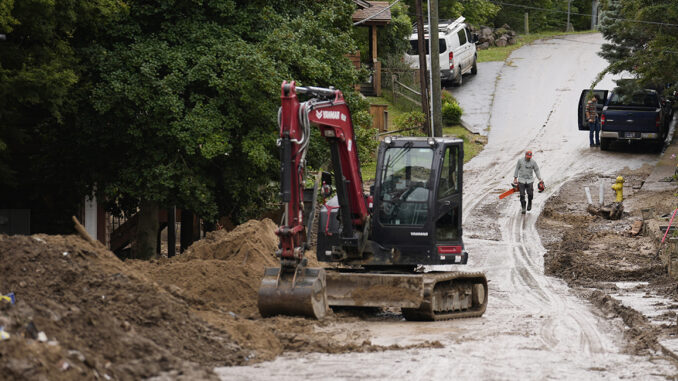
RALEIGH — The General Assembly’s House Select Committee on Helene Recovery met for the first time Dec. 11 to discuss current appropriations and future funding needs.
“It’s probably gonna be years in the recovery process,” Rep. Dudley Greene (R-Avery), the committee co-chair, said. “We’ve got a long way to go.”
Fiscal Research Division’s Mark White gave an overview of the appropriations by the General Assembly to date, which total $1.13 billion across three bills. Two of the bills were passed and enacted in October: $273 million in Session Law 2024-51 and $604.15 million in Session Law 2024-53.
An additional $225 million was passed in Senate Bill 382, which Gov. Roy Cooper vetoed due to other provisions in the bill unrelated to hurricane relief. The General Assembly completed an overrode of the veto on Dec. 11.
Presentations were also given by Samaritan’s Purse Senior Director of North American Ministries Jason Kimak, N.C. Office of State Budget and Management’s Kristin Walker and N.C. Baptist Men/Baptists on Mission Mobilization Consultant Paul Langston.
Division of Emergency Management Director and Deputy Homeland Security Advisor William C. Ray, who is overseeing the state’s post-Helene recovery efforts, also provided information to the committee.
Kimrak told lawmakers his organization has thousands of work orders in just a handful of counties: 1,672 in Watauga, 1,488 in Buncombe and 601 across Mitchell and Yancey counties.
Kimrak said more than 31,000 volunteers are doing work, and the organization has launched a Hurricane Helene Rebuild Program. Citizens impacted can apply for the program, which covers items such as manufactured home replacements, repairs to stick-built homes, new stick-built home construction, furniture assistance, and church grants.
The Hurricane Helene Rebuild Program is “free of charge” to Helene survivors in Ashe, Avery, Buncombe, Madison, Mitchell, Yancey and Watauga counties and Johnson County in Tennessee. For more information, contact USDisasterRecovery@samaritan.org by email or call 828-588-4663.
In her presentation, Walker highlighted the critical recovery challenges, including the estimated 275,000 households applying for federal assistance and the fact that 95% of the homes with FEMA-verified flood damage do not have flood insurance.
Walker cited long-lasting issues like higher construction costs and survivors’ loss of income. Additionally, electric infrastructure that serves some 2 million homes has been impacted, and 163 water and sewer systems were damaged.
“We must resolve to rebuild stronger, safer and smarter,” Walker said. “We know that works.”
Approximately 400 hazardous waste facilities were also impacted, and there were “at least” 6,000 miles of roads damaged, as well as more than 1,000 bridges, according to Walker. She estimated an overall cost of $53.6 billion, of which $41.1 billion are estimated direct costs.
The governor’s proposal for state-recommended funding is $3.9 billion. Federal funding requests currently total $25.6 billion, including $8 billion in expected eligibility-based federal funding and $17.6 billion in new federal funding requests.
Walker noted that $9.1 billion in state reserves are available, with $5.5 billion left over if the governor’s requested amount is fulfilled.
“The initial request that’s been put forward to this General Assembly was $3.9 billion, so that leaves us with $17.8 billion that would go unfunded,” Walker said of the gap between the governor’s proposal to the legislature and the estimated funds needed.
Walker said of the $954 million appropriated by the legislature so far, $335 million is tied to matching federal disaster assistance and $331 million is spread out across various loans to local governments, businesses, water/wastewater systems and underground storage tanks.
Langston told lawmakers that N.C. Baptist Men/Baptists on Mission Mobilization’s feeding kitchen has served more than half a million meals since the hurricane hit and is doing recovery and rebuild work at 16 sites across the impacted counties. He urged the committee to bolster the N.C. Office of State Budget Management’s Disaster Recovery unit in the long term to address Helene needs, calling them a “tremendous partner.”
According to Ray’s presentation, the N.C. Department of Emergency Management’s numbers show that 272,734 individuals have applied for FEMA assistance, and $14.9 million in FEMA funding has been provided to disaster survivors.
Additionally, Ray said 4,996 households remain in “transitional sheltering,” more than $1.2 million in rental assistance has been approved for 440 applicants, and 56 direct housing units are being used by 127 Helene survivors.
As of Dec. 4, FEMA’s website had indicated that of the 100 trailers for temporary housing promised for North Carolina, only 27 had been delivered. According to an extensive report by The Blaze on the housing situation in the affected areas, some 700 families in need of temporary housing are registered with EmergencyRV.org.
Ray gave a rundown of the resources deployed, including 3,100 National Guard troops and 1,686 first responders from 39 states, three U.S. territories and two countries, which Ray said was an “unprecedented” response.
FEMA’s Disaster Survivor Assistance Team has conducted 115,621 home visits, has had 55,348 survivor interactions and has 17 sites still operating in the state, Ray said.
Ray’s presentation did not mention that FEMA had dismantled its main worker village in Candler just before the Thanksgiving holiday. A Nov. 22 FEMA news release said the agency was also closing disaster recovery centers in Sparta, Dallas, Sylva and Old Fort.
Looking ahead to long-term needs, Ray highlighted housing resilience and replacement, debris removal, infrastructure repair, and help for local governments and nonprofit groups.
Greene closed the meeting citing his recent trip to Washington, D.C., to meet with North Carolina’s congressional members about Helene recovery efforts.
“I will say that North Carolina’s delegation seems completely engaged and supportive, and hopefully that we’ll be hearing something before the end of the year, hopefully before Christmas,” said Greene. “It’d be a good Christmas package to get this done. So we hope to be hearing something from that shortly.”
The Committee’s next meeting date has not been set, but it will send a letter to incoming House Speaker Rep. Destin Hall (R-Caldwell) requesting that their work be extended through 2025.



